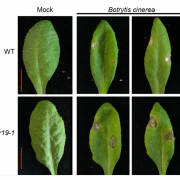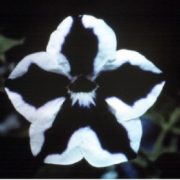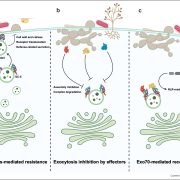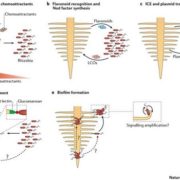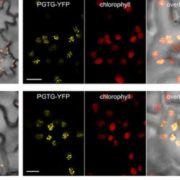Mycorrhiza-Triggered Networks in Leaves
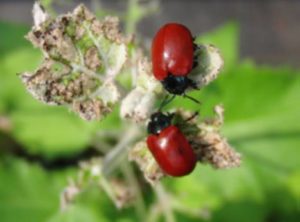 One effect of mycorrhizal fungi is to stimulate the plant immune system, leading to induced systemic resistance (ISR). Thus, mycorrhizal fungi influence the interactions between plants and aboveground herbivores. The molecular mechanisms underlying these types of beneficial microbe-plant interactions have mostly been studied in herbaceous plants. In contrast, little is known concerning whether mycorrhizae mitigate aboveground threats to tree species. To fill this gap in our knowledge, Kaling et al. (10.1104/pp.17.01810) have investigated the impact of the colonization of poplar (Populus X canescens) roots by the ectomycorrhiza Laccaria bicolor on aboveground herbivory by the poplar leaf beetle. (Chrysomela populi). The authors report that L. bicolor inoculation reduced leaf infestation of poplar and drastically decreased the oviposition of C. populi. Transcriptomic and metabolomic analyses demonstrated reprogramming of defense processes in the leaves of mycorrhizal compared with nonmycorrhizal poplars. The integration of the transcriptomic and metabolomic data of leaves by network analysis revealed the down-regulation of phenolic metabolism and the induction of protease inhibitors and aldoxime biosynthesis. Ectomycorrhizae had a systemic influence on jasmonate-related signaling transcripts. These results suggest that ectomycorrhizae may prime wounding responses and shift resources from constitutive phenol-based to specialized protective compounds. Consequently, symbiosis with ectomycorrhizal fungi enabled poplars to respond to leaf beetle feeding with a more effective arsenal of defense mechanisms compared with nonmycorrhizal poplars, thus demonstrating the importance of belowground plant-microbe associations in mitigating aboveground biotic stress.
One effect of mycorrhizal fungi is to stimulate the plant immune system, leading to induced systemic resistance (ISR). Thus, mycorrhizal fungi influence the interactions between plants and aboveground herbivores. The molecular mechanisms underlying these types of beneficial microbe-plant interactions have mostly been studied in herbaceous plants. In contrast, little is known concerning whether mycorrhizae mitigate aboveground threats to tree species. To fill this gap in our knowledge, Kaling et al. (10.1104/pp.17.01810) have investigated the impact of the colonization of poplar (Populus X canescens) roots by the ectomycorrhiza Laccaria bicolor on aboveground herbivory by the poplar leaf beetle. (Chrysomela populi). The authors report that L. bicolor inoculation reduced leaf infestation of poplar and drastically decreased the oviposition of C. populi. Transcriptomic and metabolomic analyses demonstrated reprogramming of defense processes in the leaves of mycorrhizal compared with nonmycorrhizal poplars. The integration of the transcriptomic and metabolomic data of leaves by network analysis revealed the down-regulation of phenolic metabolism and the induction of protease inhibitors and aldoxime biosynthesis. Ectomycorrhizae had a systemic influence on jasmonate-related signaling transcripts. These results suggest that ectomycorrhizae may prime wounding responses and shift resources from constitutive phenol-based to specialized protective compounds. Consequently, symbiosis with ectomycorrhizal fungi enabled poplars to respond to leaf beetle feeding with a more effective arsenal of defense mechanisms compared with nonmycorrhizal poplars, thus demonstrating the importance of belowground plant-microbe associations in mitigating aboveground biotic stress.


